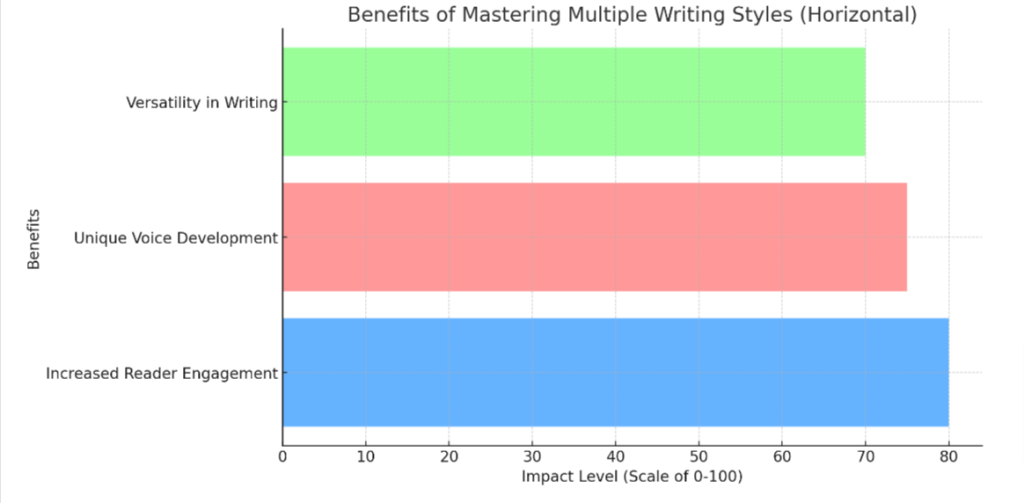Enhancing Your Writing Toolbox: Skills and Styles Explored
Crafting a compelling piece isn’t always as straightforward as it seems. Did you know there are five main writing styles that authors typically adhere to? In this blog post, we delve into these diverse writing approaches, from descriptive and persuasive to narrative, expository and creative styles.
You’ll learn why it’s beneficial to master more than one style and how exactly you can hone your craft in each area. Let’s turn those words into magic!
Key Takeaways
- There are five main writing styles that authors typically adhere to: expository, persuasive, narrative, descriptive, and creative.
- Each writing style has its own unique characteristics and purpose in engaging readers.
- Mastering different writing styles offers several benefits including engaging readers, developing a unique voice, and broadening your writing abilities.
Understanding Writing Styles
There are various writing styles that writers need to understand, including expository, persuasive, narrative, descriptive, and creative writing. Each style has its own unique characteristics and purpose in engaging readers.
Expository Writing
Expository writing shines a light on facts. It aims to inform or explain, presenting balanced analysis of a topic. In this style, the writer systematically lays out information without injecting personal opinions or feelings.
This clear and logical communication makes expository writing highly effective in many fields such as journalism and scientific research. It’s like taking readers down a well-lit path where every step increases their understanding of the subject matter.
Persuasive Writing
Persuasive writing serves as a key tool to sway the reader’s opinion. Authors use this style when they feel passionate about certain issues or want their audience to take specific actions.
The goal of persuasive writing is not only to present arguments and facts but also to convince readers through logic, reasoning, and emotion. Distinct from other styles, it employs literary devices like appeals to authority, analogies, rhetorical questions and repetition for emphasis.
This way, persuasive writing can ignite intense feelings or thoughts in readers that motivate them towards the writer’s perspective or action plan. Prioritizing your point view with strong evidence makes this writing style highly impactful in arenas ranging from advertisement copywriting to political speeches.
Narrative Writing
Narrative writing serves to tell a story, drawing readers into vivid experiences and events. It thrives on intricate details, strong character development, and coherent plot structure.
This writing style has its roots in novels, short stories, autobiographies, anecdotes – essentially any piece of content that spins a tale.
Using narrative techniques such as dialogue or flashbacks can enhance storytelling. Authors often employ sensory language to paint lucid images and engage the reader’s imagination in their narrative works.
Mastering this skill requires not just understanding principles but also practicing regularly until your words bring each scene alive for your audience.
Descriptive Writing
Descriptive writing is a style that allows the writer to paint a vivid picture with words. By using sensory details and precise language, descriptive writing brings scenes, characters, and experiences to life.
It appeals to the reader’s senses by creating images that evoke emotions and engage the imagination. With descriptive writing, readers can imagine themselves in the story or visualizing the surroundings.
It adds depth and richness to any piece of writing, whether it’s fiction or non-fiction. Descriptive writing helps create a connection between the writer and reader, making it an essential skill for capturing attention and leaving a lasting impression.
Creative Writing
Creative writing allows writers to unleash their imagination and bring their stories to life. It is a form of self-expression that involves crafting unique narratives, developing intriguing characters, and exploring imaginative worlds.
By honing your creative writing skills, you can captivate readers with compelling plots, vivid descriptions, and unexpected twists. Whether it’s through short stories, poetry, or novels, mastering the art of creative writing allows writers to tap into their creativity and create literary works that leave a lasting impact on readers.
Benefits of Mastering Different Writing Styles
Mastering different writing styles offers several benefits, including engaging readers, developing a unique voice, and broadening your writing abilities.
Engaging readers
Engaging readers is a crucial aspect of mastering different writing styles. By capturing their attention and keeping them interested, you can effectively communicate your ideas and create a connection with your audience.
Whether you’re writing persuasively, narratively, descriptively, or creatively, engaging readers will help make your writing more impactful and memorable.
Developing a unique voice
Developing a unique voice is essential for any writer. It allows you to stand out from the crowd and make your writing more memorable. By infusing your own personality, experiences, and perspectives into your work, you create a style that is distinctively yours.
This helps to captivate readers and keep them engaged throughout your piece. With a unique voice, you can connect with your audience on a deeper level and leave a lasting impression.
So don’t be afraid to let your true self shine through in your writing!
Broadening your writing abilities
Broadening your writing abilities allows you to expand your skills and become a versatile writer. By mastering different writing styles, you can effectively engage readers, develop a unique voice, and enhance your overall writing prowess.
Experimenting with language and syntax, studying various forms of writing, considering character development, practicing concision and clarity, and reading like a writer are all strategies that can help you broaden your capabilities as a writer.
With these tools in hand, you’ll be able to tackle any type of writing project with confidence.

Tips for Mastering Different Writing Styles
Experiment with language and syntax, study different writing forms, consider character development, practice concision and clarity, and read like a writer.
Experiment with language and syntax
Experiment with different language and syntax to enhance your writing skills and engage your readers.
- Try using vivid and descriptive language to paint a picture in the reader’s mind.
- Play with sentence structure by using different sentence lengths and types.
- Use figurative language such as similes and metaphors to add depth to your writing.
- Vary your vocabulary by using synonyms or finding alternative words that convey the same meaning.
- Experiment with different sentence beginnings, such as starting with an action or a description, to create a more engaging narrative.
- Break grammar rules purposefully to give your writing a unique style and voice.
Study different writing forms
Explore various writing forms to expand your skills and improve your overall writing ability. Here are some tips:
- Analyze the structure and style of different genres, such as novels, short stories, poetry, plays, and essays.
- Read works from diverse authors and observe how they approach storytelling, character development, and plot progression.
- Familiarize yourself with different writing techniques like symbolism, foreshadowing, dialogue, and imagery.
- Experiment with different narrative perspectives like first person, third person limited, or omniscient to understand their impact on the storytelling.
- Study the conventions of specific writing styles like academic writing, journalistic writing, or technical writing to ensure you can adapt to different audiences and purposes.
Consider character development
Developing well-rounded and dynamic characters is an essential aspect of mastering different writing styles. By considering character development, you can effectively engage readers and bring your stories to life. Here are some tips to help you enhance your characters:
- Give your characters depth by exploring their backgrounds, motivations, and conflicts.
- Show their growth and transformation throughout the story.
- Create believable dialogue that reflects their personalities and unique voices.
- Use physical descriptions and actions to reveal their traits and emotions.
- Develop relationships between characters that add complexity to their interactions.
Practice concision and clarity
Practice writing with brevity and clarity to enhance your skills:
- Keep sentences short and to the point.
- Use precise words to convey your message effectively.
- Eliminate unnecessary details or repetitive information.
- Organize your ideas in a logical and concise manner.
- Avoid using jargon or overly complex language.
- Revise and edit your work to ensure clarity and conciseness.
Read like a writer
To master different writing styles, it is important to read like a writer. Here are some tips to help you do just that:
- Analyze the structure and organization of the writing.
- Pay attention to the author’s use of language and syntax.
- Observe how the writer establishes characters and develops them throughout the piece.
- Take note of how the author achieves concision and clarity in their writing.
- Study the writer’s use of descriptive details and imagery to bring the story to life.
Conclusion
Mastering different writing styles is essential for any writer who wants to engage readers and develop a unique voice. By experimenting with language, studying different forms, and practicing concision and clarity, you can expand your writing abilities and become a more versatile writer.
So grab the Writer’s Stylebook and start exploring new ways to make your words come alive!

